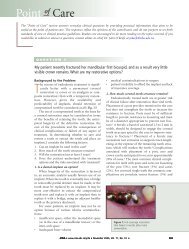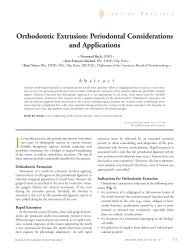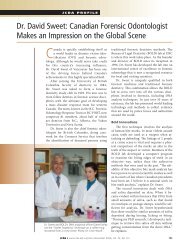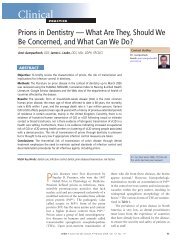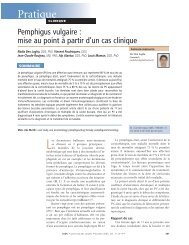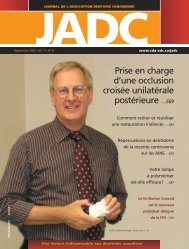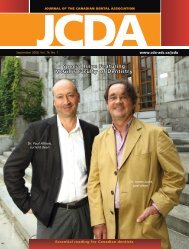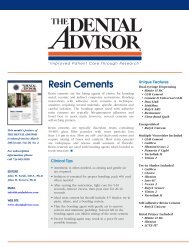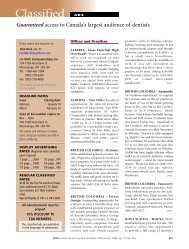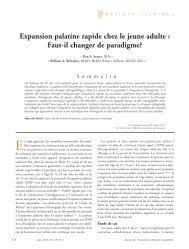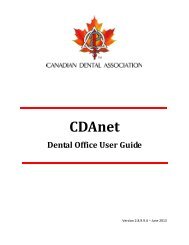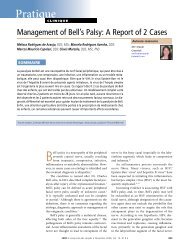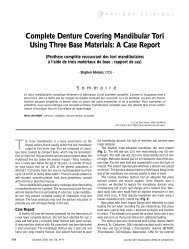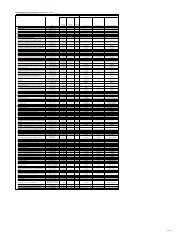JCDA - Canadian Dental Association
JCDA - Canadian Dental Association
JCDA - Canadian Dental Association
You also want an ePaper? Increase the reach of your titles
YUMPU automatically turns print PDFs into web optimized ePapers that Google loves.
Dr. John P. O’Keefe<br />
“Dentistry must<br />
always walk the<br />
fine line between<br />
its legitimate roles<br />
as a business and<br />
a profession.”<br />
EDITORIAL<br />
One Wall Worth<br />
Preserving<br />
During a recent visit to Berlin, I was<br />
impressed with the city’s strong sense of<br />
history yet striking modernity. New buildings<br />
are appearing as part of the construction<br />
boom that accompanied the city’s reunification<br />
following the fall of the Wall. The coexistence of<br />
the “old” and the “new” makes Berlin at once a<br />
traditional and avant-garde city.<br />
While I was window shopping there one<br />
Sunday, a particular shopfront caught my attention.<br />
Calling itself a <strong>Dental</strong> Wellness Lounge, this<br />
modern retail outlet had consumer oral hygiene<br />
products for sale in its window display.<br />
Beautifully modern dental operatories could be<br />
seen inside. Although the store was closed, I<br />
gathered that this was a dental “smile shop,”<br />
primarily selling tooth whitening and oral<br />
hygiene services and products.<br />
I found it interesting, given the overtly commercial<br />
nature of the dental lounge, that its<br />
immediate neighbour was an equivalent shop<br />
selling beauty and hair care products and services.<br />
Customers could very efficiently take care<br />
of their esthetic requirements by visiting these<br />
2 establishments.<br />
This smile shop concept reminded me of how<br />
dentistry must always walk the fine line between<br />
its legitimate roles as a business and a profession.<br />
I continue to hear rumblings from colleagues<br />
concerned that some members of our profession<br />
are projecting an image that is “too commercial.”<br />
This concern about the excessive commercialism<br />
of dentistry was clearly articulated at a conference<br />
I attended in Chicago.<br />
The 2-day meeting, organized jointly by the<br />
American <strong>Dental</strong> <strong>Association</strong> and the American<br />
College of Dentists, brought together leaders<br />
from many of the organizations that represent<br />
our profession in North America. The conference<br />
attendees identified manifestations of excessive<br />
commercialism that they are witnessing on a<br />
regular basis and that may be eroding the public<br />
trust in the profession.<br />
Participants were asked to rate potential factors<br />
contributing to the commercialism of<br />
dentistry. Those ranked highest were: 1) society<br />
stresses financial success and a “me first” attitude;<br />
2) traditional professional ideals are insufficiently<br />
emphasized; 3) debt from dental school<br />
adversely affects the professional behaviour of<br />
young dentists and promotes commercialism; 4)<br />
continuing education courses depict and promote<br />
dentistry as a commercial endeavour; and<br />
5) practice management courses overly emphasize<br />
profit and business success.<br />
Many were concerned that this commercialism<br />
discourse will have harmful consequences<br />
on dentistry’s current position in society<br />
— one founded on being a science-based healing<br />
profession. Attendees bemoaned the fact that the<br />
public doesn’t seem to place the same value on<br />
expertise as the profession does. As we move<br />
away from being a health care profession to<br />
providers of esthetic services, we will be pressured<br />
to operate more on our customers’ terms<br />
rather than our own. This trend will entail a lowering<br />
of the value placed on being a “profession.”<br />
The meeting attendees proposed an action<br />
plan to counter the excessive commercialism of<br />
dentistry and to ensure that perceptions of the<br />
general public and policy makers toward our<br />
profession will not be irreparably tarnished.<br />
Some notable recommendations included:<br />
creating realistic expectations for patients about<br />
what outcomes good dental care can provide;<br />
reinforcing the message that oral health is an<br />
important component of overall health;<br />
mounting a significant campaign to promote<br />
comprehensive oral health care; getting more<br />
young dentists involved in organized dentistry;<br />
increasing incentives for practising in underserved<br />
communities; advocating for increased<br />
reimbursement levels for underserved populations;<br />
and increasing expectations that dental<br />
care is based on scientifically grounded claims.<br />
This is an ambitious agenda, but one that<br />
these leaders feel is necessary for the future of<br />
our profession. Like Berlin, dentistry has always<br />
adhered to the traditional and displayed a<br />
dynamism founded in entrepreneurship. I just<br />
hope that we don’t tear down the wall separating<br />
us from excessive commercialism.<br />
John O’Keefe<br />
1-800-267-6354, ext. 2297<br />
jokeefe@cda-adc.ca<br />
<strong>JCDA</strong> • www.cda-adc.ca/jcda • May 2006, Vol. 72, No. 4 • 277



